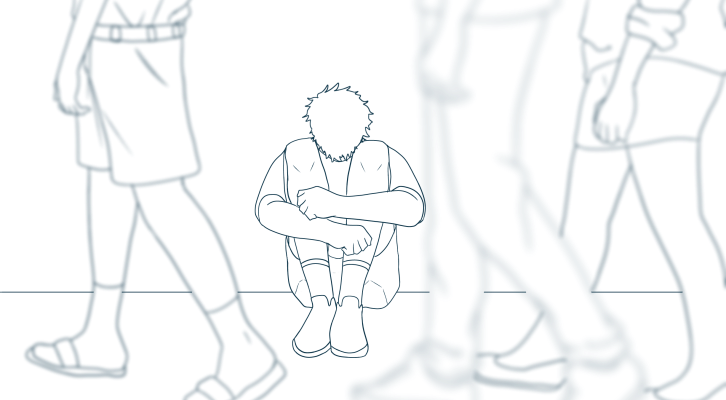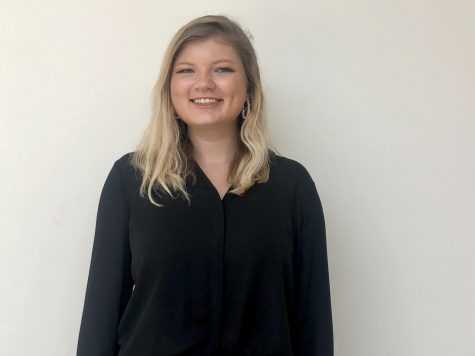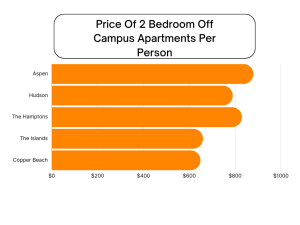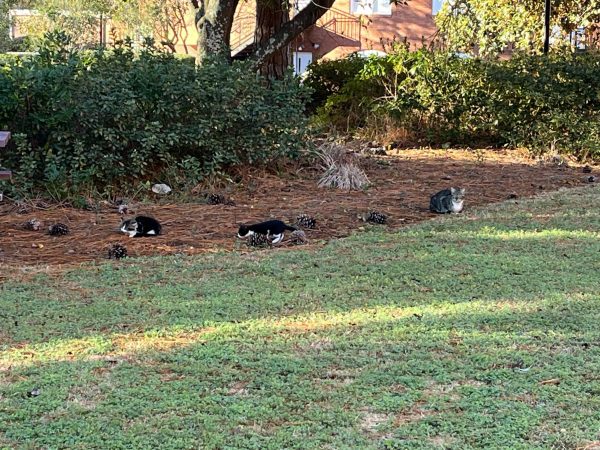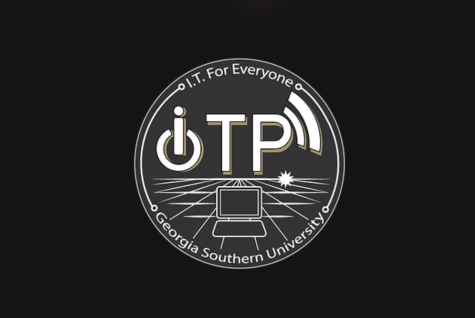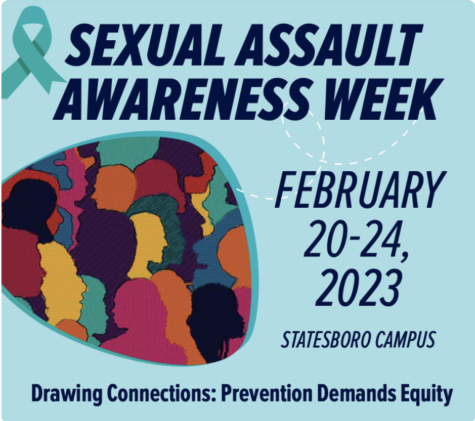Student Homelessness at Georgia Southern
January 31, 2020
Thirty six percent of university students were housing insecure at some point over the previous year, according to a 2018 survey conducted by researchers at Wisconsin HOPE Lab.
The survey defines housing insecurity “includes a broader set of challenges such as the inability to pay rent or utilities or the need to move frequently” while homelessness “means that a person is without a place to live, often residing in a shelter, an automobile, an abandoned building or outside.”
That’s over one third of college students. So what about at Southern? We aren’t able to give a specific answer.
Dean of Students Mark Whitesel said that, in his past role as associate dean for student advocacy and his current position, there have normally been one to two cases a year that they’re notified about.
Nikita Robinson, case manager and licensed professional counselor at the Counseling Center located on the Statesboro Campus, said the most cases she’s had dealing with homelessness are around 10 since she started working at the counseling center in 2015.
Editor’s Note: The story below is of a Georgia Southern student’s experience with homelessness. She asked to be kept anonymous.
One Georgia Southern student found herself living in her car.
“I didn’t have a job,” she said. “My parents were going through some financial hardship, and I kind of didn’t want to ask them for help because of financial stuff, which means I didn’t want them to apply for loans in their name for schooling or housing or anything, and I just really couldn’t afford to live on campus or otherwise, and the financial aid I was receiving just wasn’t enough.”
She was struggling a lot her sophomore year in late 2018 and early 2019. While she was facing financial hardship for an eight month time period, she soon found herself without a permanent place of residence at the beginning of the fall 2018 semester.
She was actively looking for a job during the time she was living in her car, but she struggled with finding one because most places were full or didn’t want people without any job experience.
She felt safe to an extent. She would park in hotel parking lots with security cameras for protection. She also knew that she could come to the library because, aside from weekends, it’s open for 24 hours. However, she wasn’t able to truly feel at peace because she didn’t have a space that was hers.
With only 4-5 hours of sleep a night, she suffered from lack of sleep and increased anxiety.
Her day-to-day activities involved going to class and going back to her car. She said she basically existed in Henderson Library for a while.
She was able to stay clean because the RAC had showers.
“I could be hygienic,” she said. “But it was like, being in your car, you felt dirty even though you’ve had a shower that day.”
She struggled with feelings of shame and loneliness.
“It was a lot of loneliness because, you know, I didn’t have anybody to go to. I mean, nobody really knew my situation because I wanted to keep it hidden.”
She believes there’s a stigma with homelessness.
“That’s why I wasn’t particularly fond of telling anybody about my situation is because, you know, ‘oh, she’s dirty’ or, you know, ‘she’s going to ask for money,’ or, you know, ‘she can’t handle herself or she can’t get a job, she can’t hold a job’ and stuff like that,’” she said.
Her parents weren’t aware of her living situation. She would tell them she was staying with friends.
Eating was an issue on weekends and nights. However, she had enough money for the dining plan at the beginning of the semester, so she could eat.
On top of her financial hardships, the biggest thing she was struggling with was her depression and the fact that she felt she had no one to talk to.
She also wasn’t able to pay for her medications, including her ADHD, so her mood would be down. However, while she also wasn’t able to pay for a psychologist, the counseling center helped.
Eventually, she got to a place where she just couldn’t continue staying in her car.
She asked her friend if she was able to sleep on her couch, and, when her friend discovered she didn’t have a place to live, let her stay in their spare bedroom.
Even after her friend took her in, it didn’t feel like the place was really hers because it was her friend’s place, so she just sought other places to be other than there. Though she had a roof over her head, it still didn’t feel quite like home.
Her friends, family members and support system helped get her through it. She’s now in a much better situation. She’s had a stable job for almost a year now and has more support from her family members. She has a place to live with friends who care about her safety.
She and her roommates chip in for rent every month, and she’s able to afford things like her phone bill and car insurance.
Her parents are doing better now financially, and she felt comfortable asking them to apply for loans for college.
She described the hardest thing about being homeless was “just not knowing where you’ll end up and not knowing what to do about your own situation.”
She wished people who haven’t experienced housing insecurity or homelessness to know that, sometimes, it’s not a choice.
“Sometimes, it’s not a choice. It’s not that you can’t get a job. It’s not that you can’t provide for yourself. It’s circumstances beyond your control that lead to it.”
She said that, even though those undergoing hardships may not be forthcoming with the information, it’s still important to reach out.
“If you have somebody in your life that’s struggling, you should definitely ask them, ‘Hey, do you need help?, [or] ‘’Hey, is there anything that I can do for you?’ Whether it be just having them sleep on your couch for a night or talking to them about it, it makes them feel so much better.”
She also wished people knew there were resources available.
“I wish people knew that there were alternatives,” she said. “I didn’t know this at the time because I was out of options, and I didn’t really want to talk to anybody about it, but now that I know that there are places that would’ve helped me if I needed it that I could go to, I wish that other people knew that.”
 Illustrations by Dalis Worrell
Illustrations by Dalis WorrellGS Resources:
The Dean of Students Office
“It’s something I think that there’s a little bit of stigma around,” said Dean of Students Mark Whitesel. “I don’t know that it’s easy to identify students that in that situation and, even if they’re identified, have them coming forward and feeling comfortable sharing that, I think, is a challenge for anybody that would be in that situation.”
Whitesel said the way the dean of students office handles the situations varies, and it depends on what the student’s situation is.
Whitesel said the university would meet with the student in the Dean of Students Office individually to see what kind of options there are.
He said that, if the student doesn’t have the means to cover housing, sometimes they can connect the student with the housing scholarship if they qualify. Whitesel added that, if they’re in Savannah, there may be resources that are there as far as shelters.
Whitesel added that, with the consolidation, he’s learned a bit more about what’s available in Savannah versus what’s available in Statesboro.
Whitesel said there are some universities that have been able to work with donors who have given money to the university to support either spaces or housing that could be available on kind of a retainer basis.
Ideally, if a student is homeless and is able to get independent status with their FAFSA, that’s the optimal situation to qualify for as much aid as they could, said Whitesel.
Whitesel said the office has been fortunate that some of the students that have come forward were able to be connected with resources through the housing scholarship and some other options, so they’ve been able to be in a residence hall.
The Counseling Center
Nikita Robinson is a case manager and licensed professional counselor at the Counseling Center located on the Statesboro Campus.
“My job is to supplement anything outside of the therapy realm, so if we have a student who comes in and they’re suffering from depression but maybe they also have some homelessness, then they’re going to get their therapy here, and then they’re going to have a meeting with me to figure out housing issues,” Robinson said.
Robinson describes her job as being the connection to the resources. She said that she would collaborate with the Dean of Students office to go through housing for emergency housing on Georgia Southern’s campus. She said she also has relationships within the community, and she’s aware of resources such as Eagles for Eagles that the student may be able to use to pay for their housing if needed.
Robinson said she provides anything a student may need to help them be successful, including resources for food insecurity, transportation, outside therapists or doctors and medication management.
When a student comes to the counseling center, they take an intake assessment. If they’re assessed to have any needs outside of therapy, they get scheduled with Robinson. She said a student may also get scheduled with her if they were to call in and ask for a specific resource.
First, Robinson will meet with the student for an appointment and find out their individual needs for housing.
“Sometimes, we have students who maybe they do have parents or family that they can stay with; sometimes, we have a student whose living in their car; sometimes we have a student who just can’t pay their rent, and so we figure out which area the student needs help in and then we look at the different resources that are available,” said Robinson.
If the student is living in their car, they might be able to get emergency housing for them through Georgia Southern or use some of the community resources, said Robinson.
“There are a couple places that will pay for nights in hotels,” said Robinson. “Some people will draft a letter to an apartment complex saying, ‘I will provide XYZ if you will let this individual move in today.”
Statesboro Resources:
Open Hearts Community Mission
201 Martin Luther King Jr Dr, Statesboro, Georgia 30458
Executive Director of Open Hearts Community Mission Delia Mobley said that, while they’d like to be able to help anyone that needs housing assistance, the goal is to take someone in and help them get a job to earn enough money to get back on their feet.
Mobley said they like for them to have a good cushion before they leave so that they don’t struggle, so they aim around $3,000-5,0000 in savings before they move out.
As far as students who may be experiencing housing insecurity or student homelessness, the student would have to work. Mobley said they wouldn’t be able to house them indefinitely to only go to classes; their concept is to get them back on their feet and working.
“If they were in a crisis situation, and they’re here, we would want to help them,” said Mobley.
Mobley said they have to examine every situation—it’s not cut-and-dry.
“Where we really have to get strict is if we were ever almost full, and, you know, we had people that couldn’t prove that they were working here, in school here, we might have to say ‘we can’t take you in,” said Mobley.
Mobley encouraged students experiencing homelessness or housing insecurity to reach out. They would need to fill out an application and have a background check. She added that the background check isn’t to see if the person has been in any trouble before; it’s just to check for sex offenders and any current warrants.
Once they do this and the background check is clear, they’ll set up an interview. Intakes are on Tuesdays and Thursdays, and applications need to be turned in by 4 p.m. the day before either of those days.
This article was previously published in the January 2020 print edition of The George-Anne Reflector Magazine.

